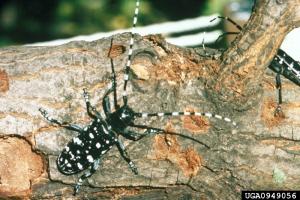
At this very moment there could be a devastating pest destroying your community’s trees called the Asian longhorned beetle (ALB). The ALB has the potential to destroy more than 70 percent of the Massachusetts tree canopy but it can be stopped. Without doubt. Our best line of defense is to have as many eyes looking for the ALB and its signs as possible. To help make this happen the U.S. Department of Agriculture has designated August as Tree Check Month.
The ask is simple – take 10 minutes this summer to check your trees for the ALB and any signs of damage it causes.
Since its discovery in 1996, the ALB has led to the removal of more than 80,000 trees, many of these in Massachusetts. This pest was first found in Asia and unknowingly hitchhiked here in solid wood packing materials, accompanying cargo moving into the United States. The ALB feeds on 13 different kinds of trees including maple, willow, elm, horsechestnut and birch. Once the beetle infests a tree, it can’t be saved and any other host tree in the nearby vicinity is at risk.
We would appreciate your help in getting the word out about August as Tree Check Month and hope that you will include our cause within your programming schedule. The PSAs we are providing are relevant any time this summer through September.
Viewers are encouraged to visit AsianLonghornedBeetle.com to report any sightings or signs of damage to help save trees in your community. Click here to watch our :30 TV Spot. To air the announcement, request files here.
Please call me at 612.617.7949 or email me at nhoover@broadheadco.com if you have any questions. For more information, visit www.AsianLonghornedBeetle.com.
Thank you in advance for your consideration of this important public service message.
Regards,
Natalie Hoover
broadhead.
123 N. Third St. Ste. 400
Minneapolis, MN 55401
P: 612.617.7949
nhoover@broadheadco.com
ABOUT THE ASIAN LONGHORNED BEETLE ERADICATION PROGRAM
Asian longhorned beetle eradication programs are cooperative programs. USDA’s Animal and Plant Health Inspection Service (APHIS) works with the U.S. Forest Service (USFS), the Agricultural Research Service (ARS) and partnering organizations in each affected state. In Ohio, the cooperative eradication program is comprised of the Ohio Department of Agriculture, Ohio Department of Natural Resources, Ohio State University Extension and Clermont County. In Massachusetts, the cooperative eradication program is comprised of the Massachusetts Department of Conservation and Recreation, Massachusetts Department of Agricultural Resources, the city of Worcester, the towns of Holden, West Boylston, Boylston, Shrewsbury and Auburn, the city of Boston, and the town of Brookline. In New York, the cooperative eradication program is comprised of the New York Department of Agriculture and Markets, New York State Department of Environmental Conservation and the New York City Department of Parks and Recreatio















